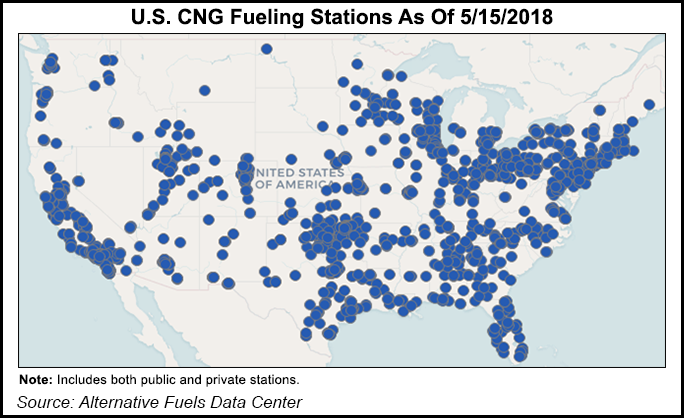Infrastructure | NGI All News Access | NGI The Weekly Gas Market Report
Pacific Northwest Group to Encourage Lower Emissions Through NGV Use
A group of Pacific Northwest businesses and nonprofits has established the Northwest Alliance for Clean Transportation with a mission to help reduce pollutants and greenhouse gas emissions by encouraging more NGV use.

Alliance members include utilities Puget Sound Energy, NW Natural, Avista and FortisBC. They are joined by nonprofits including Columbia-Willamette Clean Cities, American Biogas Council, and Natural Gas Vehicles for America.
“NGVs offer a practical and cost-effective solution to some of our most severe air quality problems,” said Connor Reiten, the group’s director of policy and operations. “This technology is a ready-made solution, and we need to get the word out to businesses and policy makers that this can make a big and immediate difference.” The alliance aims to raise awareness of the many benefits of NGVs to the Northwest, including reducing air pollution and carbon emissions while driving down fuel costs.
Elsewhere, White Plains, NY-based Fortistar LLC is pursuing several RNG projects from landfill and digester methane sources. One of Fortistar’s affiliates, TruStar Energy, is adding to the NGV fueling infrastructure for dispensing RNG. Added NGV infrastructure has perked up the prospects for RNG production sites throughout North America, according to Fortistar officials.
“RNG offers a tremendous opportunity to sustainably expand America’s transportation fuel supply,” said Fortistar President Mark Comora. Fortistar has built, invested in and managed portfolios of independent power and sustainable energy generation projects in the United States and in Canada.
In San Antonio, a transit system compressed natural gas (CNG) fueling station designed and built by Love’s Trillium CNG was dedicated in April at the regional agency’s operations campus. The 10,980-square-foot CNG facility represents the largest CNG fueling compound in North America. It is a 10-line facility supporting VIA Metropolitan Transit’s CNG fleet, which debuted last month. More than half of VIA’s diesel fleet has been converted to CNG, and all of them will be running on natural gas by 2025.
Since it began operation last year, the station has saved more than $1 million in fuel costs. Installation of the fueling station and continued procurement of lower-emissions vehicles will make VIA the largest customer of CPS Energy’s CNG fuel program, VIA officials said.
VIA’s CNG program is part of a multi-year, community-driven plan to build a better bus system while significantly reducing vehicle emissions, decreasing operating costs, and planning service enhancements, said VIA CEO Jeffrey Arndt. Once complete, the transformed fleet will bring a 97% reduction of NOx emissions and further support the agency’s commitment to environmental stewardship. The annual fuel cost savings are estimated at $8.5 million, and the maintenance savings, over a five-year period, are estimated at $2 million.
The new station includes the addition of 10 CNG dispensers operated by seven 700-HP compressors, with a total flow rate of more than 85 gallons per minute. VIA’s new CNG 40-foot buses are manufactured by Nova, and have a 67-passenger capacity. The contract with Nova Bus calls for the delivery of 425 vehicles over a five-year period
At the recently concluded Alternative Clean Transportation Expo in Long Beach, the new NGVAmerica website was introduced, offering expanded resources, including a national station locator map and a source of the latest news on the NGV sector.
Last week, French oil major Total SA signaled it would accelerate the push to convert more heavy-duty trucking fleets to run on natural gas, agreeing to invest $83.4 million, or take up to 50.8 million shares of Clean Energy Fuels Corp., to become the company’s largest stockholder with 25% ownership.
© 2024 Natural Gas Intelligence. All rights reserved.
ISSN © 1532-1231 | ISSN © 2577-9877 | ISSN © 1532-1266 |
